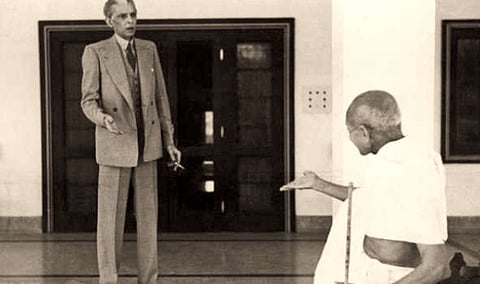- Commentary
- History Vignettes
- Notes on Culture
- Dispatches
- Podcasts
- Indian LanguagesIndian Languages
- Support

The history of the Indian freedom struggle is incomplete without the destructive role played by Muhammad Ali Jinnah to whose belated but meteoric rise Mohandas Gandhi contributed immensely. Needless, the Nehruvian history establishment carefully skirts around this staggering blunder done by the “Mahatma.” For the longest time, a simple and straightforward blame and abuse of Jinnah was the preferred method because probing the details would prove disastrous to the prestige and continuance of wily Nehruvian tyranny.
Not R.C. Majumdar. He minces no words, pulls no punches and is truthfully blunt about the respective roles of Gandhi and Jinnah. Let’s read his words verbatim.
The third great figure in the political field during the [freedom movement]…was Muhammad Ali Jinnah. In order to correctly assess the value of his work, we should not judge him merely from the point of view of the freedom movement…Jinnah…put up a brave fight. It was, however, a fight not for the freedom of India…but for the freedom of the Muslims from the tyrannical yoke of the Hindus, as he put it. He won the fight; the cult of violence decided the issue. To what extent Gandhi’s cult of non-violence may claim credit for the freedom of India is a matter of opinion. But there is no doubt that the creation of Pakistan was the triumph of violence—in its naked and most brutal form—and of the leadership of Jinnah. Nobody can reasonably doubt that India would have surely attained independence…even without Gandhi, but it is extremely doubtful whether there would have been a Pakistan without Jinnah. So, if we are to judge by the result alone, the events of 1946-7 testify to the superiority of violence to non-violence in practical politics, and of [the superiority] of Jinnah to the leaders of the Congress…It ought to serve as a corrective to those who look upon Gandhi as having wrested independence from the British by waving his magic wand of Satyagraha…Jinnah stands out as the most successful political leader of the period. Whatever Hindus might think of Jinnah, he has secured a high place in the history of the Muslim nation, a term at which we can hardly cavil after the foundation of Pakistan. He carried to its logical consummation the work that was begun by Sir Syed Ahmad…
This raises a controversial issue…whether the achievement of freedom would not have been equally facilitated by following some method other than that pursued by the Congress under the leadership of Gandhi…But it is possible to argue that equal, if not greater, success could have been attained by following the policy of Response Co-operation initiated by Tilak and accepted by Gandhi till the end of 1919…according to a school of thought, it is very likely that the transfer of power under this process would have been far more smooth and the partition of India, with all its attendant horrors, might, perhaps have been avoided. In any case…it would have saved India from the troubles and evils which necessarily resulted from the sudden transfer of power to the hands of a Party organization without any previous experience of administration. Such a danger…was fully anticipated by the Congress leaders themselves. Jawaharlal Nehru…had categorically declared that the “Congress as such would automatically cease to exist” after independence…
I may assure my readers that it has been a very painful task to have to comment adversely on the views and actions of some of our great leaders like Mahatma Gandhi and Pandit Jawaharlal Nehru who are held in the highest veneration. I shall not be surprised if what I have said about them hurts the feelings of many. My only excuse is that it is impossible to avoid all such comments in writing on a subject such as [this]. I…assure my readers that I have always tried to tell the truth, and in doing so followed no other guide than the light of my own judgment, sincerely formed, with malice to none and goodwill to all and without personal motive or ulterior motive of any kind…
It is…not unlikely that the views I have expressed may not commend themselves to any, and…a large section of my countrymen would bitterly resent some of them. But I find consolation in the wise words of one of the greatest Sanskrit poets…‘there may be somewhere, at some time, somebody who would agree with my views and appreciate them; for time is eternal and the world is wide and large.’
Concluded
The Dharma Dispatch is now available on Telegram! For original and insightful narratives on Indian Culture and History, subscribe to us on Telegram.
